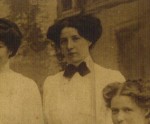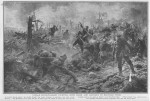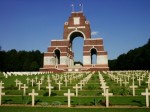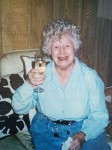 This is the second in my series about my grandmother and her six sisters and their lives, focusing on how the First Word War affected them. This article is about the second eldest sister, Alice.
This is the second in my series about my grandmother and her six sisters and their lives, focusing on how the First Word War affected them. This article is about the second eldest sister, Alice.
This is what I knew about Alice before carrying out my research. She was born in about 1883, she married before the war, her husband died young (possibly in the war) and she then emigrated to Australia with her children.
Looking at the census I found that in 1901, the year her mother was in the workhouse infirmary, she was working as a domestic servant in Chorlton for a beer and wine seller, the widow Helen E Irwell and her son Robert. She was 18 and appears to be the only servant in this household.
I also found her in the 1911 census as a general domestic servant, confirming her birthplace as Collyhurst in about 1883. The address is Higher Green Farm, Blackley, Manchester, and her employer was a farmer, Henry Kay, and his wife Ada. On the census night there were two other servants recorded, a cowman and a milk boy – so I am guessing this was a small dairy farm. Blackley is a little north of Collyhurst, and was probably open fields then, but the farm no longer exists and Blackley is now a fairly built up area.
Only a few days after the census, on 19th April 1911, Alice married Ernest Henry Parnell at Christ Church, Harpurhey, also very close to her birthplace. In the 1901 census Ernest was described as a ‘warehouseman’, living with his family. In 1911 his name was for some reason written down as ‘Hubert’, which made him difficult to find at first, but he is still with his family and is still a ‘warehouseman – Manchester trade’.
They had two children, Alice in 1913, and Henry in 1915.
By now the war had started and Ernest had enlisted and gone to war in France. Sadly, I found that he was killed in action on 15th July 1916, which led me to think that he died during the notorious Battle of the Somme, one of 420,000 British casualties. He may never have seen his baby son.
 The record of Ernest’s death records that he was a private in the Manchester Regiment of the 20th Battalion, number 17455. I was able to find out a bit more about this unit at the very useful and informative site at www.1914-1918.net and also at www.themanchesters.org/20th%20batt.htm. Another good site for searching for ancestors who died in WWI is www.forces-war-records.co.uk though you need to subscribe to search the records. Using the information on these sites I was able to work out that Ernest probably died during the Battle of Delville Wood (see artist’s depiction left). I found more information about this battle at http://www.ww1battlefields.co.uk/somme/delville.html. There is also a more detailed account of July 15th specifically at http://www.firstworldwar.com/battles/delvillewood.htm . This battle is mostly associated with the South African Brigade, so if anyone can tell me more information about the involvement of Ernest’s regiment, I would be most grateful.
The record of Ernest’s death records that he was a private in the Manchester Regiment of the 20th Battalion, number 17455. I was able to find out a bit more about this unit at the very useful and informative site at www.1914-1918.net and also at www.themanchesters.org/20th%20batt.htm. Another good site for searching for ancestors who died in WWI is www.forces-war-records.co.uk though you need to subscribe to search the records. Using the information on these sites I was able to work out that Ernest probably died during the Battle of Delville Wood (see artist’s depiction left). I found more information about this battle at http://www.ww1battlefields.co.uk/somme/delville.html. There is also a more detailed account of July 15th specifically at http://www.firstworldwar.com/battles/delvillewood.htm . This battle is mostly associated with the South African Brigade, so if anyone can tell me more information about the involvement of Ernest’s regiment, I would be most grateful.
I found out where he was buried using www.findagrave.com. This took me to the Thiepval Memorial cemetary which  also gave me a plot number. It is nice to know that the next time I am in France I could visit his grave on behalf of my Great Aunt and her family.
also gave me a plot number. It is nice to know that the next time I am in France I could visit his grave on behalf of my Great Aunt and her family.
Alice would have received a widow’s pension, but this would have been pretty minimal, and it would have been a struggle to bring up her two children – but I am sure that her six sisters must have helped. It was calculated that about 160,000 women lost their husbands during WWI
There is a book available online called Discourses Surrounding British Widows of the First World War on Google Books which gives some interesting information about the lives of widows – though as it points out, there has been little research done on this subject.
I knew that Alice emigrated to Australia some time afterwards, so I searched the worldwide emigration records on Ancestry, and I found her on the passenger lists with the two children on board the Moreton Bay embarking at Fremantle in Western Australia.
There were two things that surprised me about this: a) the date was 1928, much later than I had thought, and b), they departed from London rather than Liverpool. Further searches led me to the outward bound passenger lists which gave her last address as 1 Marine Terrace, Llanfairfechan, North Wales, and she an her daughter are listed as a ‘domestics’. So, she had moved to Wales and had worked as a domestic servant. As usual, genealogical searches had raised more questions! Why did she go to Wales?
Llanfairfechan is a lovely seaside town in the district of Conwy, and would have been quite a haven compared to Manchester – but why did Alice leave the comfort of her family to go and work there? My only guess is that the work as a servant became available through a friend of the family and offered an income for both her and her young daughter. Perhaps there were too many memories in Manchester. Whatever the reason, Alice travelled from there to London, and then made the big journey to Western Australia at the age of 44 to start a new life in Brisbane. She must have had guts.
It is possible that Alice took advantage of assisted immigration. During the 1920s, two thirds of the 300,000 immigrants to Australia were through assisted passage. The Great Depression which struck in 1929 brought an end to this, so Alice may have just got in on the tail end. The following leaflet on pdf gives more information about immigration into Australia during the 20th century: www.immi.gov.au/media/publications/statistics/federation/timeline1.pdf
I found Alice in the Australian electoral registers living at Fortitude Valley, Brisbane. I also found a record of her death on 19th December 1952. She had never married again.
As for her children, my mother remembers Henry coming over to England to visit them in the early 50s. She tells me he was an incredibly handsome man – but he does not seem to have been married, and I cannot find any other  records for him in Australia. As for young Alice, she married (possibly twice) and emigrated to Hawaii and did a lot of work for voluntary organisations. She visited the UK about 15 years ago and we met her for lunch in Stratford on Avon. She was a lovely, lively lady, and died a few years ago leaving my mother a small legacy. She must have been well into her nineties when she died.
records for him in Australia. As for young Alice, she married (possibly twice) and emigrated to Hawaii and did a lot of work for voluntary organisations. She visited the UK about 15 years ago and we met her for lunch in Stratford on Avon. She was a lovely, lively lady, and died a few years ago leaving my mother a small legacy. She must have been well into her nineties when she died.
In summary, while some women’s lives were improved during the war, in terms of status and work, for many women it left them bereaved, struggling to bring up young children on very little money. For Alice, it seems that there was nothing left for her in Britain, and I hope hew new life in Australia brought her better happiness.
Useful Links:



Hi,
thank you for writing about your Grandmother and her family.Women have an amazing inner strength and show fortitude in many situations.My family has a Story of my Great-Aunt who was only married four days and within months became a War Widow for the rest of her life here in Australia. I am very interested in writing her Story in Honour of all Women who paid the incredible sacrifice for the rest of their lives. This Sacrifice included the loss of the Husband they loved, the loss of Children and the journey of being a Parent, the loss of Family milestones,including Weddings and the birth of Grandchildren. Being a Widow in those times may have insured the constant battle of poverty and hardship for some even with a small Pension.
Will need to research and then decide about the style of Story but thank you for your Story.
Janney Talbot
janneyt@spin.net.au
Hi Janney – thank you very much for your kind comments and for your contribution. Good luck with writing your story, and I hope this has given you some inspiration 🙂
Ros